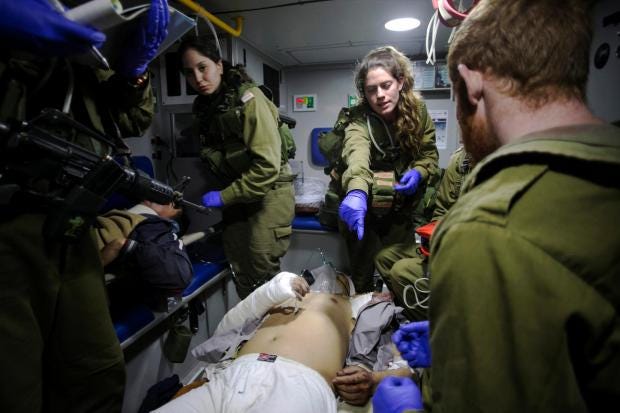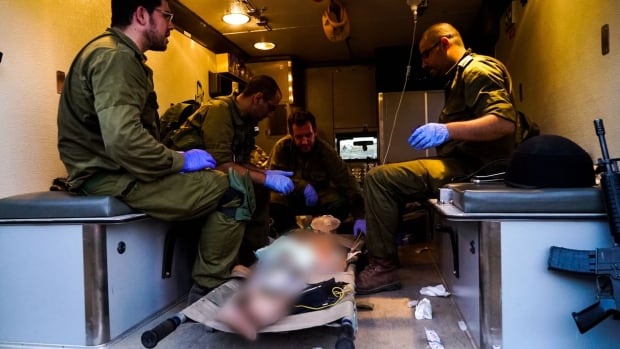Fond Hope
"We [Israel] faced a dilemma [with civil war raging across the border]."
"The decision was made by our commanders and our government to allow them [conflict-wounded Syrians] to enter the country and to give them full medical treatment."
Dr. Noam Fink, chief medical officer, Israeli military, northern command
"So far the strategy [to permit Syrian rebels and wounded civilians to enter Israel for medical treatment] is working."
"It is an intelligent policy. It is not only altruistic [in purpose]."
Amos Harel, military affairs analyst, Haaretz newspaper
"It [Israel] is not the monster they [Syrian propaganda] told us it was."
"People have started looking at it differently [from the perspective of its humanitarian initiatives to aid those in dire medical need]."
Shadi Martini, Syrian director, Multifaith Alliance
 |
| Israeli soldiers give initial medical treatment to wounded Syrians in the Israeli-occupied Golan Heights on 18 January 2017 REUTERS |
It was in 2013 that wounded Syrians began arriving at the border fence Israel had erected at the Golan Heights at the outbreak of civil war in Syria. The medical condition of these fighting men requiring immediate treatment presented Israel with few options in responding, other than humanitarian. At the same time, it was realized that this could be a way in which Israel could assure Syrians that they were not viewed as enemies, though clearly Syrians did consider Israel just that.
In the realization that Syrian medical facilities had been savagely reduced in the towns and villages close to the Israeli border, scarcely capable of functioning, since the Syrian regime made such facilities the focus of special targeting, an estimated four thousand wounded in the war along with desperately ill Syrians have been treated by Israel.
In an area where an estimated 200,000 people live, with an additional 400 displaced families living in tent encampments along the border, Israel is equipping new clinics in the area. According to Israeli analysts, cash, ammunition and intelligence assets make their way through the Golan Heights fence, with the Wall Street Journal quoting local Syrian rebels affirming receipt of cash for salaries and weapons.
Israel does, of course, maintain a distance from becoming involved in the Syrian conflict for the past six years. Where it has intervened is when convoys of weapons have been driven toward Lebanon to supply Hezbollah fighting in Syria for Bashar al-Assad. Alternately, when errant Syrian government fire has hit the Israeli-controlled Golan Heights, Israel has responded in retaliation.
Israel has not committed to taking in Syrian refugees for temporary settlement relief, though accepting a large group of orphaned children was considered, but never followed through on, given the formal state of war between Syria and Israel. It was the Israeli general public's distress over the humanitarian disaster unfolding in Syria that appears to have motivated their military to launch aid across the border.
Truckloads of humanitarian supplies such as flour, generators, fuel, construction materials, shoes, baby formula, antibiotics, even vehicles and mules have been transported across the security fence from Israel into Syria. This is a project by the Israeli military named Operation Good Neighbour initiated in 2016. For the humanitarian effort to succeed it took cooperation between Israel and Syrian doctors and village leaders.
Syrian border villages falling to the regime's forces or to Iran-linked Shiite militias, or to anti-Israeli militias linked to Sunni al-Qaeda or ISIL forces would spell security disaster for Israel. With Israel's concern to keep the area free of such threats comes the decision to aid Syrian rebels.
 |
| Israeli army medics tend to an injured Syrian in the occupied Golan Heights. (IDF) |
The supplies ferried through to the Syrians in an effort to reduce their humanitarian plight are donated by Israeli and foreign nongovernmental groups, with the government of Israel paying for the medical treatment itself. Israel has become a staging area as well for Syrian aid groups operating abroad facilitated by the Israeli military, enabled to ship goods into Syria through Israeli ports.
Perhaps it should be recalled that Israel also regularly treats Palestinians from the West Bank and Gaza. In particular it should be a reminder that such assistance does not necessarily result in relaxed relations between Israel and the Palestinian leadership. Among the Palestinian Authority leadership whose family members have sought emergency surgeries to be undertaken in Israel, there is no let-up of inciting deadly terror attacks against Israeli targets.
Hamas whose charter specifically aims at the obliteration of Israel and whose leadership celebrates every Palestinian terrorist killing of Jews as a celebratory victory, sees no reason to relax its lethal vendetta against Israel, despite its own leaders' families receiving advanced medical care in Israeli hospitals at the hands of Israeli doctors. It is folly to believe that what does not work with Palestinians may work with Syrians.
This is without doubt well understood by the Israeli leadership. But to lead is to demonstrate moral and ethical leadership in a democracy and the very reasons given for responding to the desperate need of Syrians as a humanitarian responsibility is reason enough to offer it and provide it, and hope that perhaps by some miracle of human nature, those acts of compassion will bear the fruit of conciliation not through weakness but through strength of character.
| A Syrian man, four women and two children, who were injured by shrapnel during the fighting in Syria, were brought to Israel for treatment. Among the wounded was a 3-year-old girl who suffered a serious head wound. The girl was evacuated with her mother by helicopter to Rambam Hospital in Haifa, and the rest of the wounded were taken to hospitals in the north by IDF medical teams. Photo: IDF |
Labels: Civil War, Humanitarian Aid, Israel, Rebels, Syria, Wounded
0 Comments:
Post a Comment
<< Home